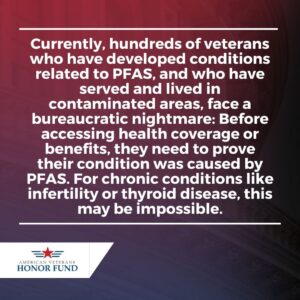Last June, Congressman Dan Kildee of Flint repackaged and resubmitted the Veterans Exposed to Toxic PFAS Act, or VET PFAS. This bill would ensure veterans and active military receive health coverage for the treatment of health conditions linked to PFAS exposure.
The proposal is the latest chapter in a long saga, which seeks to protect active military personnel from the dangers they face while serving their country. If approved, the bill would provide similar protections to the PACT ACT, which currently simplifies any disability claims related to burn pits and Agent Orange exposure.
The Controversy Behind PFAS
The acronym PFAS is shorthand for per-and polyfluoroalkyl substances. This is a group of thousands of volatile chemicals that can contaminate the soil and water sources in certain areas.
PFAS are used in many manufacturing industries, including military ones. They also break down very slowly, and can therefore contaminate an area for years. As a result, hundreds of U.S. military sites around the world are now known to be contaminated by PFAS.
According to the Environmental Protection Agency (EPA), the Center for Disease Control and Prevention (CDC), and a mountain of evidence, PFAS are bad news for health. We now know that PFAS exposure increases your risk of several types of cancer, infertility, thyroid disease, and even pregnancy hypertension. As a result, the European Union now has a wide-encompassing Convention to progressively eliminate their use.

However, the U.S. Department of Defense is yet to be fully on board with the evidence of PFAS. Currently, hundreds of veterans who have developed conditions related to PFAS, and who have served and lived in contaminated areas, face a bureaucratic nightmare: Before accessing health coverage or benefits, they need to prove their condition was caused by PFAS. For chronic conditions like infertility or thyroid disease, this may be impossible.
What’s the PFAS Bill all About?
The proposal behind the “Veterans Exposed to Toxic PFAS Act” is to establish a “service-connected presumption” between exposure to PFAS and a series of chronic, possibly disabling conditions.
If a service member or veteran develops any condition from a pre-approved list and has served in an area known to be contaminated by PFAS, then the condition will have to be considered as “service connected.” This means the U.S. Department of Veterans Affairs (VA) will have to cover all related health expenses at its hospitals. In addition, veterans and their family members would also be eligible for disability payments if affected by any of these conditions.
Can You Get Coverage under the VET PFAS Act?
Not yet – although Congressman Kildee is working hard to change this. Unfortunately, this is not the first initiative to hold institutions accountable for the effects of PFAS. Between 2018 and 2022, a bipartisan group of legislators – the Congressional PFAS Task Force – pushed forward a series of bills aimed at reducing the industrial uses of PFAS. Congressman Kildee also attempted to secure coverage for a group of Air Force members who had served at Wurtsmith Air Force Base, and who are currently dealing with the health consequences. So far, all these attempts failed.
Image Credit: Photo by Joel Rivera Camacho


